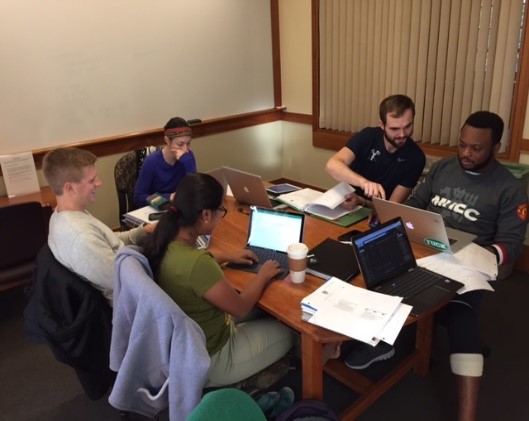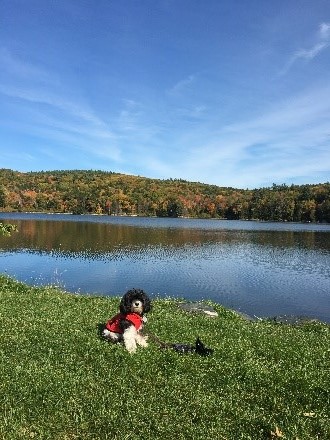Events & Promotions
|
|

GMAT Club Daily Prep
Thank you for using the timer - this advanced tool can estimate your performance and suggest more practice questions. We have subscribed you to Daily Prep Questions via email.
Customized
for You
Track
Your Progress
Practice
Pays
Not interested in getting valuable practice questions and articles delivered to your email? No problem, unsubscribe here.
- Nov 20
07:30 AM PST
-08:30 AM PST
Learn what truly sets the UC Riverside MBA apart and how it helps in your professional growth
Kudos
Bookmarks
| FROM Tuck Admissions Blog: Extra-Ordinary Companies |
 By Erica Toews T'18 Led by students, Tuck industry treks are amazing ways to travel, explore industries, and engage with company leaders. I arrived in Hanover feeling invigorated after the entrepreneurship and venture capital (VC) trek to New York. Eight Tuck students visited several companies over the course of two days. Each meeting felt intimate, and we usually went around in a circle and shared our backgrounds. I was humbled that company founders, whose time is extremely valuable, were interested in learning about us. While most of my classmates are going through on-campus recruiting, the trek opened me up to new and exciting career opportunities. The first company we visited was Primary Ventures, a VC firm that provides seed funding to early stage startups. Brad, one of the two partners, offered us coffee and bagels and spoke with us about the tech ecosystem in New York compared to the Silicon Valley. Primary Ventures shares an office with one of the companies they invest in, Square Foot, which facilitates renting office space. We met the CEO, who advised us not to start a company for the sake of being an entrepreneur, but only if we are passionate about a brilliant idea. It reminded me of these lines from Charles Bukowski: “unless it comes out of / your soul like a rocket, / unless being still would / drive you to madness or / suicide or murder, / don’t do it. / unless the sun inside is / burning your gut, / don’t do it.” We rode the Subway uptown to Lowenstein, a law firm that helps startups in all industries and at all stages. Jonathan, who began his career at a biotech startup and now serves as Counsel to startups, spoke about how every company faces unique challenges. This means there is no one-size-fits-all approach to questions around how to incorporate, how to handle founders equity, and when to go public. We traveled back downtown to meet Matt and Steve at Bain Capital Ventures. Associates focused on data services and fintech, their time is spent sourcing deals, performing due diligence, and managing deals. When I asked how they decide what to invest in, they said their two strategies are “big ideas” and “big ears”. The first is a top-down approach driven by a thesis or idea, and the second is a bottom-up approach that involves going to conferences and keeping up with literature on new founders. Squarespace, a company that makes it easy for people to build beautiful websites, has a different vibe than the firms. Their exquisite office space includes a rooftop with an epic view of the Manhattan skyline. We met Margaret, a GSB grad who described her role as a combination of business development, strategy, product, and marketing. She contrasted Facebook’s culture of “Move fast and break things” with Squarespace’s belief that good work takes time. Margaret encouraged us all to change our mindset from the question of What can I do to what do I want to do? The next morning at Namely, an HR platform for mid-sized companies, the VP of Marketing shared what it was like to be hired as the twenty-sixth employee and watch the company grow to over 350 people. He spoke about the balance of maintaining a tight-knit office culture and growing a business. In true tech fashion, the office was full of couches, bean bag chairs, and plants, and had a well-stocked kitchen. We took the Subway uptown to SeatGeek, which was founded by Dartmouth ’07 grads Russ and Jack. SeatGeek is a marketplace for people to buy sports and concert tickets. The company shifted its focus early on from forecasting ticket sales to e-commerce. Russ said it’s important to constantly think about how your company can expand. He explained that most people weren’t working at their desks that day because they were in the middle of a hackathon. At Gotham Ventures, we met Lucas, a computer scientist turned venture capitalist. He graduated from Tuck in ’09 and worked on security at Adobe before joining Gotham. His technical background shone through: at one point, he drew a picture on a whiteboard to teach us about zero-knowledge proof in cryptocurrency. He strongly advised us to start a company or at least work at a startup before going into VC. Our final visit was to 1stdibs, an online marketplace for luxury goods. As soon as we walked in, they offered us beer on tap. Their office is very chic, and I truly believe that all 275 employees have a love of beautiful things. Caitlin, a T’13 and the manager of Marketplace Trust, said 1stdibs pivoted from a “fancy Craigslist” to a “fancy eBay,” meaning they shifted from listings to e-commerce. After a whirlwind trip, I’m fired up on the job search. The trek served as a reminder of how strong the Tuck fabric is: every Tuck alum we met gave us their contact information and encouraged us to reach out. YOU MIGHT ALSO LIKE |
This Blog post was imported into the forum automatically. We hope you found it helpful. Please use the Kudos button if you did, or please PM/DM me if you found it disruptive and I will take care of it.
-BB
souvik101990
 Expert
Expert
Alum
Joined: 19 Mar 2012
Last visit: 11 Nov 2025
Posts: 4,321
Own Kudos:
Given Kudos: 2,326
Location: United States (WA)
Concentration: Leadership, General Management
Schools: Ross '20 (M)
GMAT 1: 760 Q50 V42

GMAT 2: 740 Q49 V42 (Online)

GMAT 3: 760 Q50 V42 (Online)

GPA: 3.8
WE:Marketing (Non-Profit and Government)
Expert reply
Kudos
Bookmarks
Hi. Anybody who applied for the Nov 2 deadline: did you receive any notification about materials submitted?
Kudos
Bookmarks
| FROM Tuck Admissions Blog: Straight Outta Q&A: Greater Dartmouth, Specializations |
 While the questions we hear in our on-campus Q&A session (part of every prospective student visit) can run the gamut, some stick out as being really insightful and others we hear over and over again. Wouldn’t it be great if we could share those answers with all prospective students? We think so! Here are some recent themes that have come up. Q: Can you take classes in other schools at Dartmouth / what is the relationship like between Tuck and all of the other Dartmouth programs? A: Yes, Tuck students are able to take courses within other Dartmouth programs. In the past, students have taken courses at Thayer (the engineering school), undergraduate language courses, and courses that are part of the MHCDS (Master of Health Care Delivery Science) curriculum. There are other ways to collaborate as well. For example, the members of Tuck Women in Business (WIB) mentor undergraduate women and the DEN (Dartmouth Entrepreneurial Network) brings together participants from across the Dartmouth community. Tuck’s research centers and initiatives also collaborate with centers and institutes across Dartmouth on events, research projects, and student programming. It’s important to remember, that as a Tuck graduate, you are also a Dartmouth graduate and will have the depth of the wider alumni network as well. At the heart of “OneDartmouth” lies a commitment to encourage dialogue and collaboration between the many diverse and valuable students of Dartmouth in an effort to foster a stronger sense of oneness and community. And more! Q: What can you specialize in as a student? A: Tuck is a general management program and doesn’t require students to limit the kind of courses they take through specializations or majors. An MBA is a leadership degree, preparing people to lead companies, departments, brands, and people. It’s important that business leaders have a (knowledgeable) 10,000 feet view of a business—this is the purpose of Tuck’s extended core curriculum during the first-year. After your first-year at Tuck, you’ll have a strong foundation in all the essential aspects of business, both hard skills and soft skills. During your second year, you can tailor the curriculum to the topics you’re most interested in, or the skills you think you most need to enhance. To do this, there are a wide variety of elective courses and opportunities for independent study. Tuck 360 is awesome, but make sure you join us live too. You can register for a self-initiated visit/interview here (just make sure you’re coming within the deadline that corresponds to your particular application round). |
This Blog post was imported into the forum automatically. We hope you found it helpful. Please use the Kudos button if you did, or please PM/DM me if you found it disruptive and I will take care of it.
-BB





















